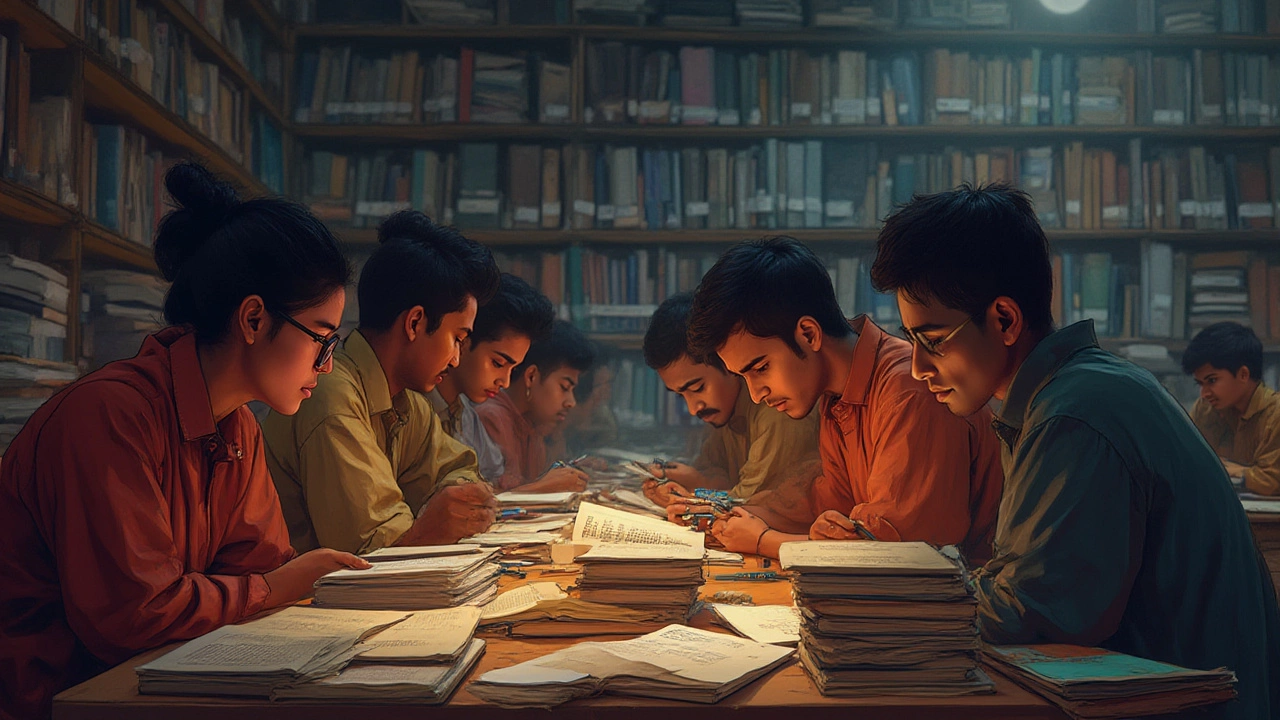You’d think people who willingly sign up for the world’s toughest exams have nerves of steel or a thirst for self-torture. But let’s be real—sometimes, it’s just about grit, opportunity, or chasing a dream no matter the odds. Picture this: more than a million students hunched over test papers, coffee cups shaking, the weight of their entire future bearing down. Or imagine sitting for six grueling hours after months of crunching numbers and theory, all for a pass rate in the single digits. Madness? Maybe. Yet these exams are milestones people push themselves towards—year after year—to snatch a spot among the elite. What are the three absolute hardest exams in the world? And what does it feel like to be in those high-pressure rooms? Some of these stories are jaw-dropping.
UPSC: India’s Civil Services Exam Turmoil
Every year, over one million Indians take a gamble on the Union Public Service Commission (UPSC) Civil Services Exam—an exam that's the ultimate gatekeeper for jobs like IAS, IPS, and IFS. It’s not just tough; it’s legendary. Imagine prepping for a test where less than 0.2% of applicants snag a win. That means out of every 1000 people, only about two make it. The competition is so fierce that many start studying two or three years in advance, diving deep into history, politics, economics, current affairs, ethics, even basic math and essays. And don’t forget the wild cards: random, brutally specific questions that might pop up about anything from obscure treaties to recent environmental policies.
The real pain point? This isn’t just one test—for UPSC, there’s the Prelims (objective, to weed out the masses), the Mains (nine long papers spanning everything from language to your chosen subject), and finally, an interview where you’re grilled by a panel. The unpredictability keeps even the brightest wide awake at night. You’ll hear stories of people giving 12 hours a day for months, their social lives on pause, their dogs (like my Rusty) totally neglected. And this exam isn’t just about recalling facts—it’s about connecting dots, thinking on your feet, and sounding convincing. One year, the existing affairs section asked about something that had happened literally just a week before the test.
Here’s a breakdown of UPSC’s numbers to drive the point home:
| Year | Applicants | Qualified Prelims | Qualified Mains | Final Selections |
|---|---|---|---|---|
| 2023 | 11,00,000 | 13,000 | 2,500 | 1,000 |
| 2022 | 10,50,000 | 12,500 | 2,700 | 1,025 |
Tips? There’s no secret sauce, but mock testing is key, as is having a reading list with at least six daily newspapers and regular revision cycles. Don’t obsess over rare trivia—UPSC wants big thinkers, not encyclopedias on legs. Take breaks, keep your brain fresh, and if you have a Rusty in your life, definitely sneak in some walks.
Gaokao: China’s Fiery College Entrance Marathon
If you thought JEE or NEET prep was tough, welcome to the annual Chinese Gaokao exam—a national fever that can make or break a family’s entire future. Held every June, Gaokao lasts for up to nine hours over two or three days in roasting classrooms. Over 12 million students sit for this nightmare each year, racing for a shot at the country’s best universities. The pressure isn’t just social; it’s national news. Entire cities go quiet, traffic patterns are changed, and parents stand outside classrooms clutching good-luck charms and water bottles. In rural provinces, getting a top score can mean a permanent ticket out of poverty. No surprise, then, that students start cramming from as early as age 10.
The Gaokao tests Chinese language, mathematics, and a foreign language (often English), along with additional subjects like sciences or humanities, depending on the student’s chosen track. Some questions are infamous for being almost philosophical; you might be asked to write essays on deceptively ‘simple’ sentences that require exploring deep moral or social questions. Math sections often stump even math teachers. Cheating? Not a chance. Surveillance is military grade—think facial recognition devices and drones hovering over exam halls.
For context, here’s a quick look at college acceptance odds via Gaokao:
| Year | Test Takers | Top University Admissions | Acceptance Rate |
|---|---|---|---|
| 2023 | 12,200,000 | 800,000 | 6.5% |
| 2022 | 11,930,000 | 780,000 | 6.5% |
If you want to survive Gaokao, you need stamina more than smarts. Regular meal routines, strict revision schedules, and serious sleep discipline help. Peak performers in China avoid last-minute pushes and focus on mastering fewer topics deeply—less about breadth, all about depth. Breathing exercises are a popular hack, as are ‘memory palaces’ for tough vocab.

CFA: Gold Standard in Finance—But At What Cost?
If you see someone in a suit sobbing over a calculator, chances are they’re prepping for the Chartered Financial Analyst (CFA) exam. It’s the Everest of finance tests, spread across three levels that each require a monster amount of prep—think 300 hours per level, minimum. What makes the CFA so brutal? The breadth of the material is wild: economics, accounting, ethics, portfolio theory, derivatives, fixed income, alternative assets. You name it, you’ve got to know it. Level I is mostly about knowledge recall and concepts (multiple-choice), but by Level III, you’re tackling real-world scenario analysis and essay questions, often with no time to second-guess yourself. And the questions aren’t predictable—curveballs fly in every section.
Globally, the pass rates tell the story. About 42% clear Level I. By Level III, fewer than half the initial starters are left. Here’s what the recent pass rates look like:
| Year | Level I | Level II | Level III |
|---|---|---|---|
| 2023 | 37% | 44% | 48% |
| 2022 | 42% | 47% | 46% |
The kicker? You only get two or three tries a year, and the whole process (if you actually clear all three in a row) will still eat up at least three years of your life. CFA questions are notorious for being ambiguous—many aspiring finance pros sit and argue over the ‘least-wrong’ answer options post-exam. For prep, online study groups, practice with financial models, and relentless quiz-taking help a ton. Set a calendar, and never, ever leave Ethics to the end. Skimping that section is why even sharp candidates sometimes fail—it counts for up to 15% of the total marks. Don’t forget to schedule downtime; serious burnout is common, and a tired brain won’t get you through.
The CFA might not make breaking news, but in the finance world, passing it instantly sets you apart. It’s proof that you can survive a gauntlet—one that spits out most of the competition.
What Makes These Exams Insanely Difficult?
So why do these three make all the lists of toughest exams? It’s not just about scary pass rates or endless syllabus. What really cranks up the difficulty is the mix of intense competition, mental exhaustion, unpredictable questions, and massive stakes. In India, clearing the UPSC could launch you into a role leading lakhs of citizens, shaping laws, and running districts. In China, Gaokao decides if you’ll move to a top city or stay in a remote village. For CFA, it’s the ticket to big leagues in banking, wealth management, or global investment jobs—a signal you can handle crises, markets, and regulation shifts like a boss.
Another thing: these aren’t just exams, they’re marathons. You prep not just the brain but your strategy, emotions, even your social circles. Parents book therapists for their kids before Gaokao, study groups for CFA candidates basically become substitute families, and UPSC aspirants often sacrifice years for just a single shot. Some jokes in Chennai coaching centers are half true—when people say the only company you’ll truly keep during prep is textbooks and your slightly-sulkier-than-usual dog (I see you, Rusty).
If you’re planning to take on any of these, remember: plan early, focus on core topics, and schedule serious rest time. Apps that track revision habits, mindfulness exercises, and peer feedback can become game changers. Don’t fall for social pressure or Insta stories about 14-hour study routines. Quality always beats sheer hours. Get comfortable with uncertainty—these exams love to test how you handle surprise, not just how much you’ve memorized.
